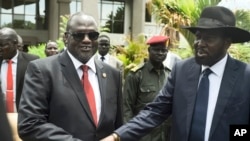South Sudan's President Salva Kiir, First Vice President and former rebel leader Riek Machar, and Vice President James Wani Igga met this week to talk about the remaining stumbling blocks impeding full implementation of the peace agreement.
William Ezekiel, undersecretary of the National Committee for Information, said the three leaders discussed the demilitarization of Juba City, cantonment sites for SPLA-In Opposition forces in the three regions of Upper Nile, Equatoria and Bahr El Ghazal, and the dispute over the 28 states that Kiir unilaterally created last year.
Ezekiel said the leaders will form a national committee to study proposed states and borders that are mutually agreeable.
"After agreeing on the number of states, … a technical committee will be established to identify … borders between the states,” Ezekiel said. “They will work in consultation with the community-based groups. They will work also with chiefs [and] with relevant bodies of major interest to this."
Ezekiel said the committee is to report back to the leaders within 30 days with a recommendation on the number of states and their borders.
The committee is made up of 15 members: four from the SPLM, three from the SPLM-In Opposition, one from the former detainees, two from the political parties and three from the Troika countries of the United States, Britain and Norway. Tanzania and South Africa will also contribute two members.
Ezekiel said SPLM-IO officials are eager to resolve the matter of Kiir's 28 states, which were carved out of the existing 10 states after the peace agreement was signed in August 2015.
"It is a positive step forward in the implementation of the peace agreement,” Ezekiel said. “This issue of 28 states has been widely regarded not only inside South Sudan, but up to [the] international level as a major violation to the peace agreement."
The three leaders agreed to form the Transitional National Legislative Assembly and are expected to meet again Friday to continue their discussions on other thorny issues pertaining to full implementation of the peace agreement and the work of the Transitional Government of National Unity, which was formed in April.
The United States and other western countries have roundly criticized the Transitional Government of National Unity's failure to fully implement the August peace agreement.







